人教新目标版英语七年级上册 Unit 5 Do you have a soccer ball-Section A课件(共10张PPT)
文档属性
| 名称 | 人教新目标版英语七年级上册 Unit 5 Do you have a soccer ball-Section A课件(共10张PPT) | 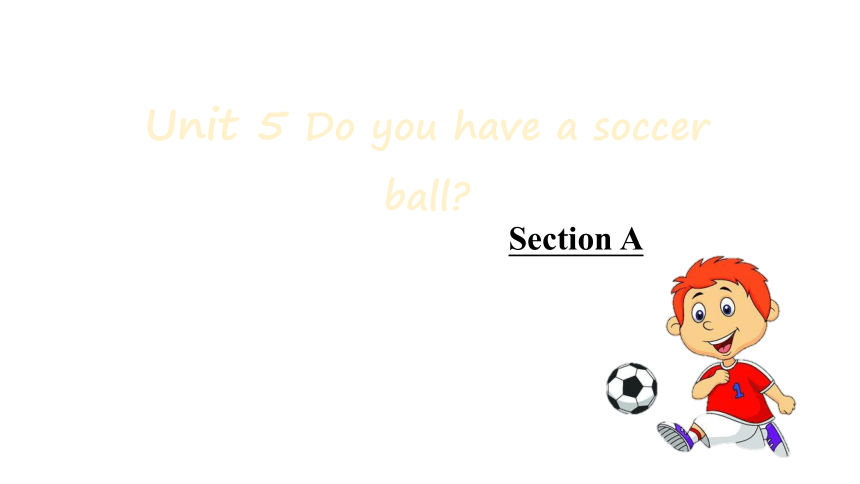 | |
| 格式 | pptx | ||
| 文件大小 | 14.2MB | ||
| 资源类型 | 教案 | ||
| 版本资源 | 人教新目标(Go for it)版 | ||
| 科目 | 英语 | ||
| 更新时间 | 2023-06-06 18:35:51 | ||
图片预览

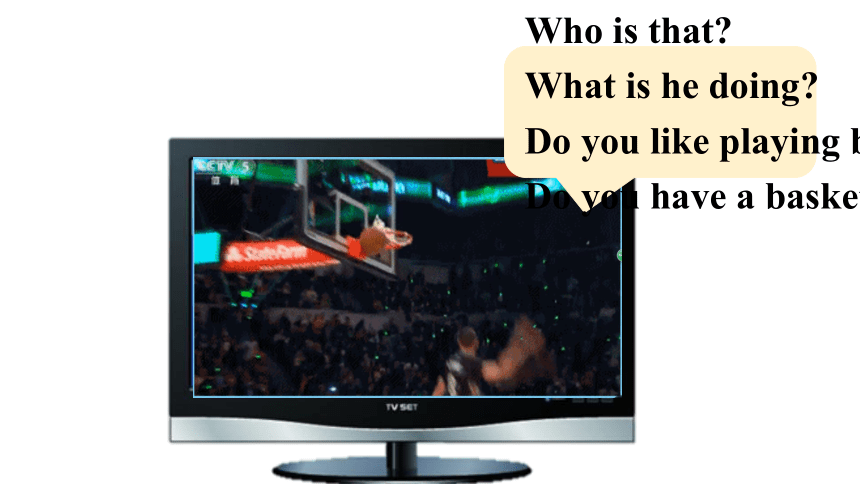
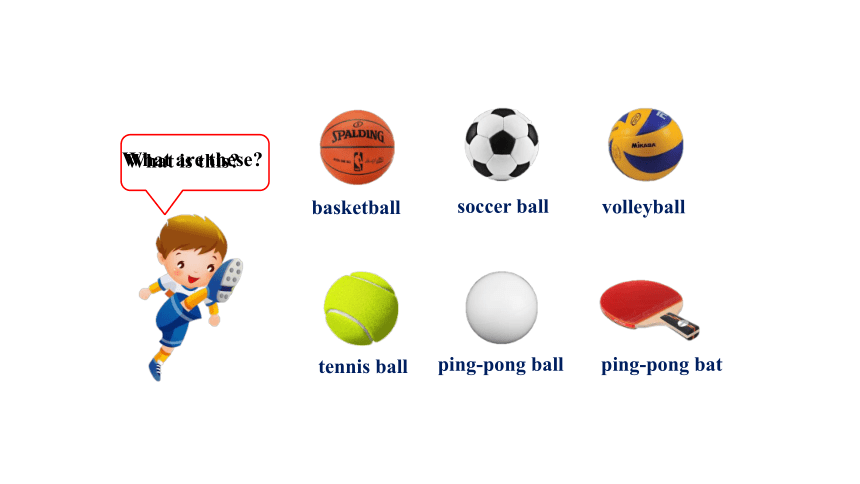
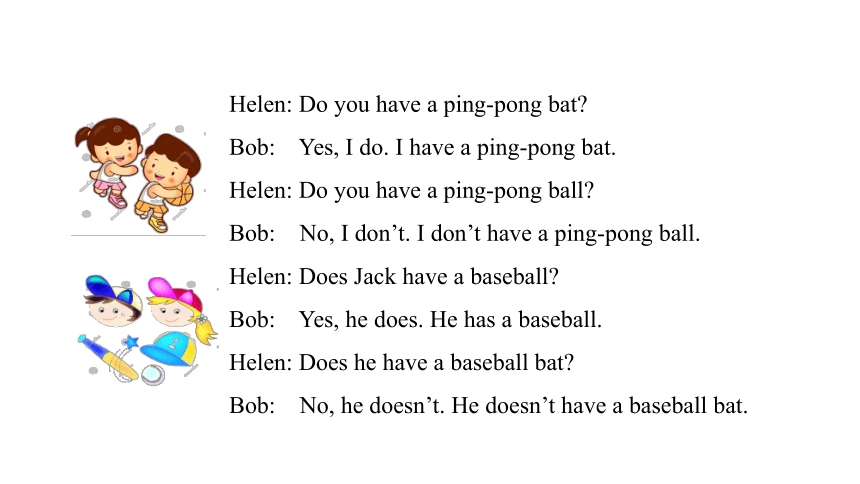
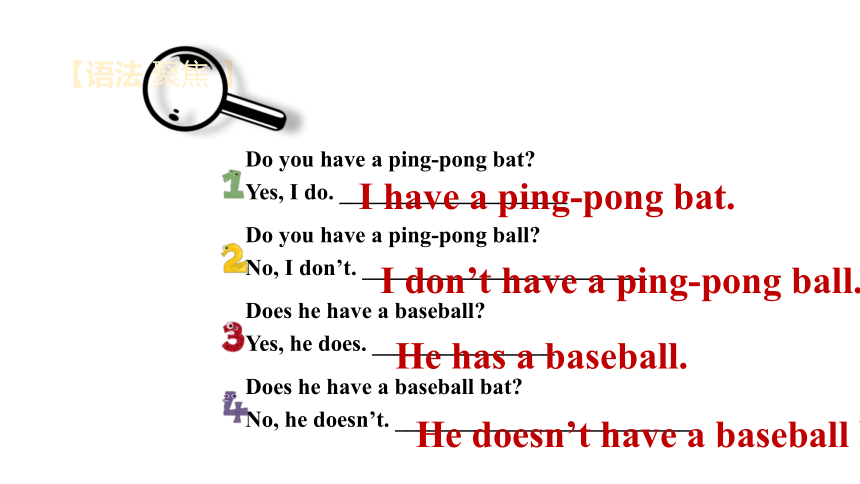
文档简介
(共10张PPT)
Section A
Unit 5 Do you have a soccer ball
NBA扣篮大赛
Who is that
What is he doing
Do you like playing basketball
Do you have a basketball
basketball
soccer ball
volleyball
tennis ball
ping-pong ball
ping-pong bat
What are these
What is this
Helen: Do you have a ping-pong bat
Bob: Yes, I do. I have a ping-pong bat.
Helen: Do you have a ping-pong ball
Bob: No, I don’t. I don’t have a ping-pong ball.
Helen: Does Jack have a baseball
Bob: Yes, he does. He has a baseball.
Helen: Does he have a baseball bat
Bob: No, he doesn’t. He doesn’t have a baseball bat.
【语法 】
Do you have a ping-pong bat
Yes, I do. ____________________
Do you have a ping-pong ball
No, I don’t. _________________________
Does he have a baseball
Yes, he does. ________________
Does he have a baseball bat
No, he doesn’t. __________________________
聚焦
I have a ping-pong bat.
I don’t have a ping-pong ball.
He has a baseball.
He doesn’t have a baseball bat.
表示:
(某人)拥有(某物)
(have 的第三人称单数为has)
例如:
我有一本书。 I have a book.
他有一本书。 He has a book.
他们有一些书。 They have some books.
1. have/has的用法
【知识讲解】
have
I have a ping-pong bat. Jack has a baseball.
【注意】
存在句:There be + 某物/某人
表示: 某地方存在有某物或某人
例如:
桌子上有一本书。
There is a book on the
table.
桌子上有两本书。
There are two books
on the table.
He likes English.
Does he like English
He doesn’t like English.
He can do homework.
Can he do homework
He can’t do homework.
2. 陈述句变疑问/否定句之间的方法:
三看法
He is a student.
Is he a student
He isn’t a student.
一看有无be动词,有则提前be动词或后加not。
二看有无情态动词can/may/must等,有则提前或后加not。
三看两者都没有,提前助动词(do/does/did等)
或后加not放在动词前。
Does Jack have a baseball bat
He doesn’t have a baseball bat.
Bob / Helen
Bob: Hey, Helen, let’s go! We’re late!
Helen: OK.
Bob: Do you have the baseball
Helen: Yes, I do. It’s in my bag.
Bob: And where’s our baseball bat
Helen: Bill has it.
Bob: Oh, yeah. And do you have your jacket
Helen: Oh, no, I don’t. It’s on the chair.
Let me get it.
Bob: And your hat, too!
Helen: OK, I have my jacket and hat. Let’s go!
Let’s go
Bob: Hey, Helen, let’s go! We’re late!
Helen: OK.
Bob: Do you have the baseball
Helen: Yes, I do. It’s in my bag.
Bob: And where’s our baseball bat
Helen: Bill has it.
Bob: Oh, yeah. And do you have your jacket
Helen: Oh, no, I don’t. It’s on the chair.
Let me get it.
Bob: And your hat, too!
Helen: OK, I have my jacket and hat. Let’s go!
We’re late
Bob: Hey, Helen, let’s go! We’re late!
Helen: OK.
Bob: Do you have the baseball
Helen: Yes, I do. It’s in my bag.
Bob: And where’s our baseball bat
Helen: Bill has it.
Bob: Oh, yeah. And do you have your jacket
Helen: Oh, no, I don’t. It’s on the chair.
Let me get it.
Bob: And your hat, too!
Helen: OK, I have my jacket and hat. Let’s go!
Bob / Helen
【重点】
咱们走吧!
Let sb+动词原形
Let’s=let us 让我们一起做某事
例如: 让他进来!
Let him come in!
咱们去上学吧!
Let’s go to school!
意思是: 我们迟到了。
be late for+名词 干某事迟到
例如:他上课迟到了。
He is late for class.
我上课没迟到 。
I am not late for class.
1. 表示某人拥有什么:人+have/has ...
2. 表示某地存在什么:There is/are...
3. 陈述句变疑问句的方法:
三看法:提前be动词;情态动词;助动词于句首
4. 陈述句变否定句的方法:
三看法:把be/情态/助动词加not后放于动词前
5. Let’s+动词原形 让我们做……吧!
6. be late for …… 迟到
【知识小结】
Section A
Unit 5 Do you have a soccer ball
NBA扣篮大赛
Who is that
What is he doing
Do you like playing basketball
Do you have a basketball
basketball
soccer ball
volleyball
tennis ball
ping-pong ball
ping-pong bat
What are these
What is this
Helen: Do you have a ping-pong bat
Bob: Yes, I do. I have a ping-pong bat.
Helen: Do you have a ping-pong ball
Bob: No, I don’t. I don’t have a ping-pong ball.
Helen: Does Jack have a baseball
Bob: Yes, he does. He has a baseball.
Helen: Does he have a baseball bat
Bob: No, he doesn’t. He doesn’t have a baseball bat.
【语法 】
Do you have a ping-pong bat
Yes, I do. ____________________
Do you have a ping-pong ball
No, I don’t. _________________________
Does he have a baseball
Yes, he does. ________________
Does he have a baseball bat
No, he doesn’t. __________________________
聚焦
I have a ping-pong bat.
I don’t have a ping-pong ball.
He has a baseball.
He doesn’t have a baseball bat.
表示:
(某人)拥有(某物)
(have 的第三人称单数为has)
例如:
我有一本书。 I have a book.
他有一本书。 He has a book.
他们有一些书。 They have some books.
1. have/has的用法
【知识讲解】
have
I have a ping-pong bat. Jack has a baseball.
【注意】
存在句:There be + 某物/某人
表示: 某地方存在有某物或某人
例如:
桌子上有一本书。
There is a book on the
table.
桌子上有两本书。
There are two books
on the table.
He likes English.
Does he like English
He doesn’t like English.
He can do homework.
Can he do homework
He can’t do homework.
2. 陈述句变疑问/否定句之间的方法:
三看法
He is a student.
Is he a student
He isn’t a student.
一看有无be动词,有则提前be动词或后加not。
二看有无情态动词can/may/must等,有则提前或后加not。
三看两者都没有,提前助动词(do/does/did等)
或后加not放在动词前。
Does Jack have a baseball bat
He doesn’t have a baseball bat.
Bob / Helen
Bob: Hey, Helen, let’s go! We’re late!
Helen: OK.
Bob: Do you have the baseball
Helen: Yes, I do. It’s in my bag.
Bob: And where’s our baseball bat
Helen: Bill has it.
Bob: Oh, yeah. And do you have your jacket
Helen: Oh, no, I don’t. It’s on the chair.
Let me get it.
Bob: And your hat, too!
Helen: OK, I have my jacket and hat. Let’s go!
Let’s go
Bob: Hey, Helen, let’s go! We’re late!
Helen: OK.
Bob: Do you have the baseball
Helen: Yes, I do. It’s in my bag.
Bob: And where’s our baseball bat
Helen: Bill has it.
Bob: Oh, yeah. And do you have your jacket
Helen: Oh, no, I don’t. It’s on the chair.
Let me get it.
Bob: And your hat, too!
Helen: OK, I have my jacket and hat. Let’s go!
We’re late
Bob: Hey, Helen, let’s go! We’re late!
Helen: OK.
Bob: Do you have the baseball
Helen: Yes, I do. It’s in my bag.
Bob: And where’s our baseball bat
Helen: Bill has it.
Bob: Oh, yeah. And do you have your jacket
Helen: Oh, no, I don’t. It’s on the chair.
Let me get it.
Bob: And your hat, too!
Helen: OK, I have my jacket and hat. Let’s go!
Bob / Helen
【重点】
咱们走吧!
Let sb+动词原形
Let’s=let us 让我们一起做某事
例如: 让他进来!
Let him come in!
咱们去上学吧!
Let’s go to school!
意思是: 我们迟到了。
be late for+名词 干某事迟到
例如:他上课迟到了。
He is late for class.
我上课没迟到 。
I am not late for class.
1. 表示某人拥有什么:人+have/has ...
2. 表示某地存在什么:There is/are...
3. 陈述句变疑问句的方法:
三看法:提前be动词;情态动词;助动词于句首
4. 陈述句变否定句的方法:
三看法:把be/情态/助动词加not后放于动词前
5. Let’s+动词原形 让我们做……吧!
6. be late for …… 迟到
【知识小结】
同课章节目录
- starters 预备篇(2012秋审查)
- Unit 1 Good morning !
- Unit 2 What’s this in English?
- Unit 3 What color is it ?
- Unit 1 My name's Gina.
- Section A
- Section B
- Unit 2 This is my sister.
- Section A
- Section B
- Unit 3 Is this your pencil?
- Section A
- Section B
- Unit 4 Where's my schoolbag?
- Section A
- Section B
- Unit 5 Do you have a soccer ball?
- Section A
- Section B
- Unit 6 Do you like bananas?
- Section A
- Section B
- Unit 7 How much are these socks?
- Section A
- Section B
- Unit 8 When is your birthday?
- Section A
- Section B
- Unit 9 My favorite subject is science.
- Section A
- Section B
